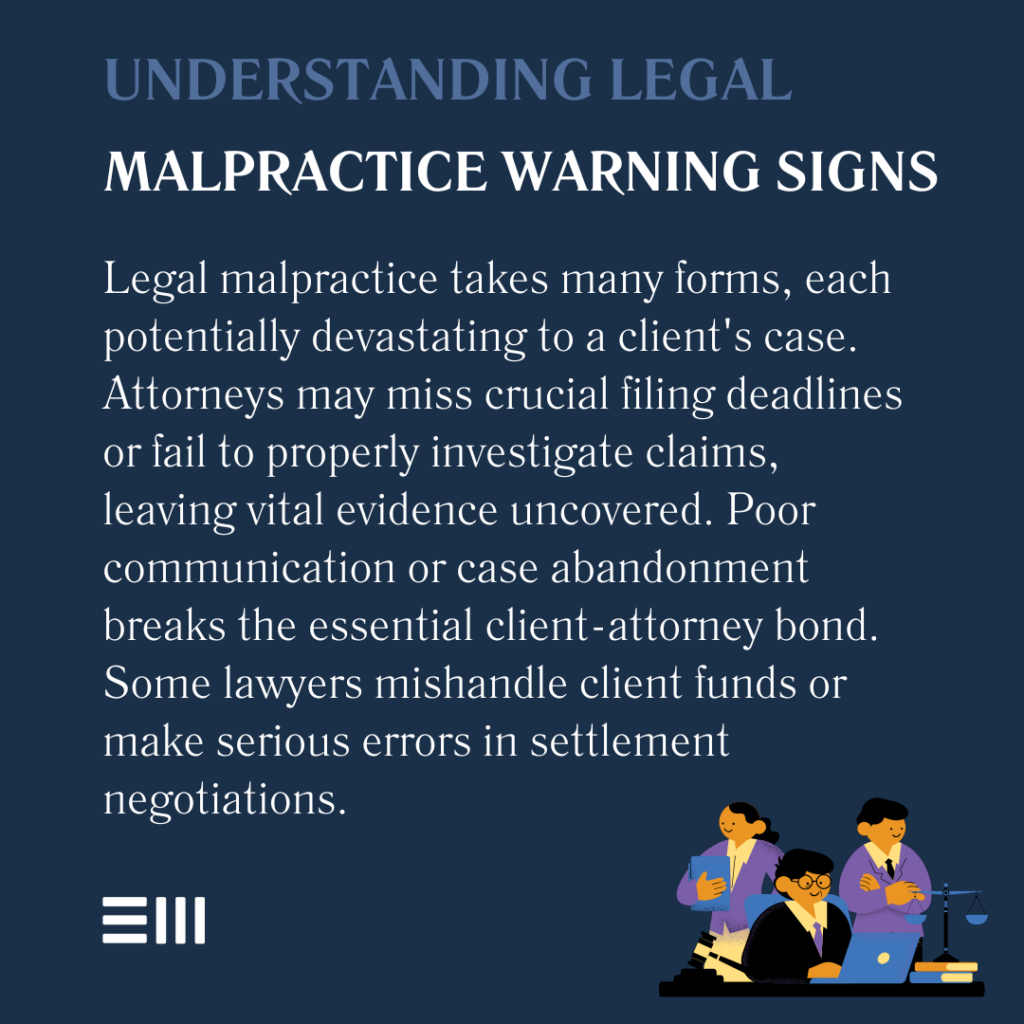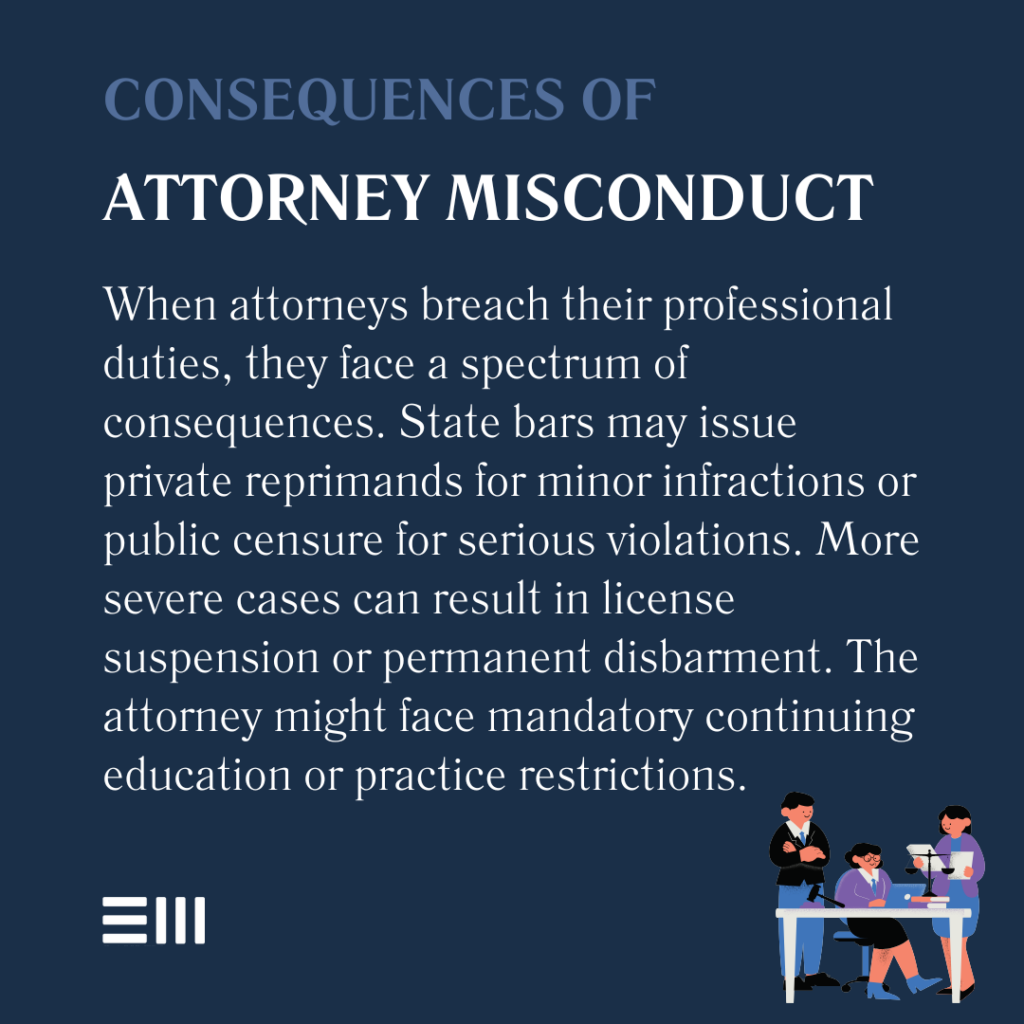
Trust forms the foundation of every attorney-client relationship.
When that trust shatters through negligence or misconduct, clients often feel betrayed, confused, and unsure where to turn.
The very professional meant to protect your interests has potentially caused harm, leaving you to navigate a complex system designed to hold attorneys accountable.
Understanding Legal Malpractice
Legal malpractice occurs when an attorney fails to provide competent representation, causing harm to their client.
Understanding the basics helps determine whether you have grounds for a complaint. Each case requires careful evaluation of specific circumstances and resulting damages.
Common Types of Legal Malpractice
Legal malpractice can occur in various forms, each with the potential to undermine a client’s trust and jeopardize their case.
From missed filing deadlines to conflicts of interest, these actions—or inactions—can have far-reaching consequences. Issues such as improper case preparation, misuse of client funds, and poor communication can erode the attorney-client relationship and significantly impact legal outcomes.
- Missed filing deadlines and statutes of limitations;
- Failure to properly investigate claims;
- Inadequate case preparation;
- Conflicts of interest;
- Misuse of client funds;
- Settlement errors;
- Failure to follow client instructions; and
- Poor communication or abandonment.
These failures can severely impact case outcomes and client interests. Recognizing these failures is the first step in seeking accountability and protecting your rights.

Elements of a Valid Claim
Building a successful legal malpractice claim requires meeting several essential criteria. Establishing an attorney-client relationship is foundational, but it’s equally important to prove that a breach of professional duty directly caused harm.
Demonstrating measurable damages, providing evidence of missteps, and filing within the statute of limitations are critical to strengthening your case.
- Existence of an attorney-client relationship;
- Breach of professional duty;
- Causation between breach and harm;
- Measurable damages from the breach;
- Timely filing within the statute of limitations;
- Documentation of the attorney’s actions;
- Evidence of proper client communication; and
- Proof of resulting financial losses.
Meeting these requirements strengthens the foundation of your complaint. A well-documented complaint supported by tangible proof ensures your claim has the best chance of being heard and resolved effectively.
The Complaint Filing Process
Filing a legal malpractice complaint involves multiple steps and careful attention to detail. Understanding this process helps ensure proper handling of your complaint.
Initial Documentation
Gathering comprehensive documentation supports your complaint:
- Written communications with the attorney;
- Court filings and legal documents;
- Financial records and payments;
- Meeting notes and summaries;
- Calendar entries and timelines;
- Witness statements, if applicable;
- Expert opinions on standard of care; and
- Evidence of damages incurred.
Strong documentation forms the backbone of successful complaints.
State Bar Requirements
Each state bar association maintains specific requirements:
- Proper complaint forms completion;
- Supporting evidence submission;
- Verification of claims;
- Timeline adherence;
- Fee requirements, if any;
- Format specifications;
- Contact information accuracy; and
- Notarization when required.
Following these requirements precisely prevents unnecessary delays.
Professional Consequences
Legal malpractice complaints can result in various professional consequences for attorneys. Understanding these outcomes helps set realistic expectations.
Potential Disciplinary Actions
State bars may impose different levels of discipline:
- Private reprimands;
- Public censure;
- License suspension;
- Permanent disbarment;
- Mandatory continuing education;
- Practice restrictions;
- Supervision requirements; and
- Restitution orders.
These actions protect future clients and maintain professional standards.
Civil Remedies
Separate from disciplinary actions, civil remedies include:
- Monetary compensation;
- Fee reimbursement;
- Damage recovery;
- Interest payments;
- Court costs coverage;
- Expert witness fees;
- Related expenses; and
- Punitive damages in severe cases.
Civil remedies aim to make clients whole after malpractice.

Impact on Original Case
Legal malpractice often affects the underlying case that led to the attorney-client relationship. Understanding these implications helps in pursuing appropriate remedies.
Case Recovery Options
Several options may exist for salvaging the original case:
- New attorney representation;
- Case reopening procedures;
- Appeals processes;
- Settlement negotiations;
- Alternative dispute resolution;
- Deadline extensions;
- Evidence preservation; and
- Damage mitigation strategies.
Acting quickly improves recovery chances for the original case.
Timeline Considerations
Time factors critically affect both cases:
- Original case deadlines;
- Malpractice claim limitations;
- Documentation preservation periods;
- Appeal windows;
- Investigation timeframes;
- Expert review periods;
- Settlement negotiation timing; and
- Court scheduling requirements.
Understanding these timelines prevents missed opportunities.
Common Questions About Legal Malpractice in Alabama
Many clients face similar concerns when considering legal malpractice complaints in Alabama.
Here are answers to frequently asked questions about the process and its implications.
How Do I Know if I Have a Valid Claim?
Key factors determine claim validity:
- Clear attorney-client relationship establishment;
- Specific professional duty breaches;
- Direct connection between breach and harm;
- Measurable damages or losses; and
- Timely complaint filing capability.
Determining the validity of your claim involves evaluating key factors such as breaches of duty, harm caused, and measurable damages.
By consulting with a legal professional and addressing these elements, you can assess your case’s potential for success.
What Evidence Should I Gather?
Essential documentation includes:
- All communications with your attorney;
- Legal documents and filings;
- Payment records and agreements;
- Timeline of events and meetings; and
- Witness information when applicable.
Collecting thorough evidence is crucial for building a strong claim. Keeping detailed records of communications, payments, and legal documents ensures you have the support needed to substantiate your case and present a compelling argument.
How Long Do I Have to File?
Time limitations vary by jurisdiction:
- State-specific statutes of limitations;
- Discovery rule applications;
- Continuous representation considerations;
- Tolling provisions; and
- Filing deadline exceptions.
Understanding your filing timeline is essential to preserving your rights. Statutes of limitations and other timing rules vary, so consulting a knowledgeable attorney can help you meet deadlines and ensure your claim remains valid.
Protect Your Rights Today
Don’t let legal malpractice derail your justice journey.
Our experienced team understands the complexities of holding attorneys accountable and can help you navigate the complaint process while protecting your interests.
Can't find what you're looking for? Search our site below.










